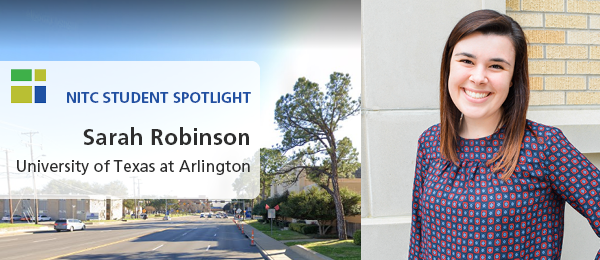Student Spotlight: Sarah Robinson, University of Texas at Arlington

Sarah Robinson is a doctoral candidate at the University of Texas at Arlington in Arlington, Texas and a NITC dissertation fellow. Her research primarily focuses on service provision and utilization by survivors of intimate partner violence. Sarah's NITC dissertation will explore the transportation challenges of survivors in intimate partner violence shelters. She is particularly interested in how the built environment (i.e. the structure, location, design of service agencies and transportation networks) impacts survivors’ abilities to access services and survivors’ outcomes, such as future experiences of violence and overall health and well-being.
NITC Researcher Profile | ResearchGate Profile
Tell us about yourself?
My name is Sarah Robinson and I am a current doctoral candidate at the University of Texas at Arlington. I primarily research intimate partner violence and the challenges survivors face accessing the resources they need to get help for their experiences of abuse. My focus is on the two needs I hear most frequently in my work with survivors: housing and transportation. In addition to my academic career, I am a huge animal lover, passionate knitter, and travel enthusiast. I am a native Texan and currently live with my two dogs, cat, and two chinchillas.
What (or who) has influenced your career path in transportation?
I first learned about transportation inequity when I was working as a case manager for a community agency which assisted survivors of intimate partner violence. I worked with clients who did not have their own transportation and I struggled to find ways to help them get to places that weren’t along fixed public transportation routes. When I started my doctoral program, I was fortunate to work as a graduate research assistant for Dr. Steve Mattingly, Dr. Courtney Cronley, and Dr. Noelle Fields on a NITC-funded transportation project looking at transportation barriers in my community for environmental justice populations. It was through that project I realized that I could impact transportation planning decisions in my community as a social worker.
You've been awarded funding for a NITC dissertation on "Identifying and Measuring Transportation Challenges for Survivors in Intimate Partner Violence Shelters." Tell us about that research?
Given that I realized I could potentially influence planning decisions in my community related to transportation, I chose to focus my dissertation on transportation barriers and challenges for survivors of intimate partner violence living in shelters. Often survivors who enter shelter do not have their own transportation due to financial constraints or their vehicle being in their abusive partner's name. Therefore, they rely on the shelter staff, other residents, and any available public transportation to get to places of employment or other necessary services they need to restart their lives. However, there are still tremendous gaps. The purpose of my dissertation is to capture those gaps in service and the impact those gaps have on survivors' success while in shelter. Additionally, I am looking at whether shared mobility services, such as ride-hail and car-share programs, could mitigate some of the transportation barriers survivors face.
After graduation, what future work do you envision doing in transportation?
For my future research, I hope to build on my dissertation research by obtaining grant funding to place a car-share program at a shelter or a transitional housing program. I also hope to use my dissertation research to highlight the challenges sheltered survivors face obtaining transportation to advocate for better public transportation routes near the shelter. Transportation is a vital resource for survivors, and I hope to be a part of creating transportation networks that not only benefit survivors but benefit the community as a whole.
This is an installment in a series of monthly Student Spotlights we're shining on students and alumni that are involved with National Institute for Transportation & Communites (NITC) universities. NITC is a university transportation consortium funded by the U.S. DOT, and is a Portland State-led partnership with the University of Oregon, Oregon Institute of Technology, University of Utah, University of Arizona, and University of Texas at Arlington.
